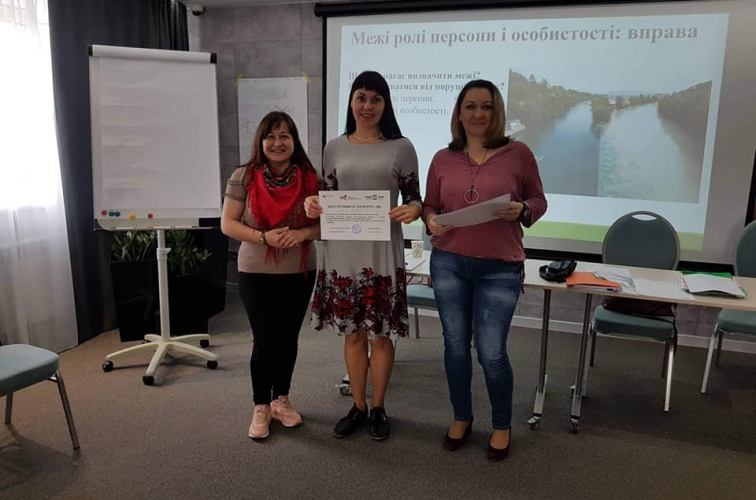Psychological First Aid and Crisis Intervention: training for psychologists in Chernihiv
The news has been published: 22.04.2019

On April 19 – 21, the "Psychological first aid and crisis intervention" training was implemented in Chernihiv. Trainer Olena Sudakova, medical psychologist-psychotherapist, PhD in Psychology, noted:
"The training is aimed at developing the following competencies of first aid providers in crisis situations: the ability to determine a safe approach to the situation for yourself and others; the ability to say and do the most favourable for people under stress things; the ability not to do further harm to people with your words or actions. The training provides the participants with various opportunities to develop their own competence in productive first aid".
According to the trainer, the main purpose of the training is to understand the limits of support that psychologists can provide, as well as the ability to navigate when you need to redirect people to get more specialized care, and how to do it, given the specifics of the issue. Olena Sudakova added that first aid could be provided by anyone, regardless of his/her education, profession and other features, such as age, gender, etc.
The trainer noted that the crisis intervention is a short-term psychosocial assistance to victims of emergencies, which is provided in case of unexpected traumatic events.
“The main purpose of crisis intervention is to reduce the feeling of distress and humility among the victims, to help them to recognize and acknowledge the situation, to support the victims in a new, unexpected and difficult situation. A crisis intervention differs from that of psychological, psychotherapeutic and psychiatric in much the same way as a first aid directly on the spot differs from surgery in sterile, specially provided conditions. Crisis intervention is a front-end activity. If the victim needs crisis intervention and it is implemented correctly, this helps a person to overcome prejudices about psychological services. Such victims are much more likely to accept further care, if necessary, and vice versa - people who have not received psychosocial assistance (PFA, CI) are more likely to treat specialists with prejudice and do not seek help," the psychologist explained.
A distinctive feature of this training is crisis simulation in a safe and comfortable environment. Simulation provides an opportunity to vividly and practically highlight the critical and most common problems and troubles in the process of providing assistance, and also provides an opportunity for participants to mark their personal and professional boundaries in the process of assistance.
"From the trainers' point of view, the topic of the training is quite relevant and in demand among aid providers, given the fact that there are still no programs for mastering such techniques at the state educational level and everything rests on the public sector, so the participants’ efforts were expected", Olena Sudakova summed up.
The training was implemented within the “Crisis prevention and Peace building in Ukraine – Time to Act!” project, supported with German Federal Foreign Office’s funds by IFA (Institut für Auslandsbeziehungen), Funding programme zivik.
Read our other news
We bring together people with an active civic position
Join our team!
